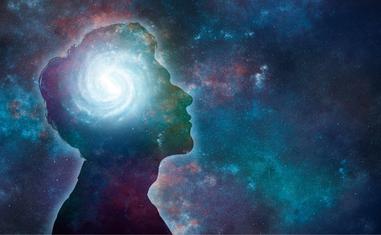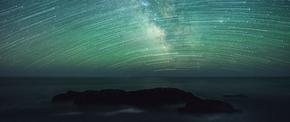The views expressed in our content reflect individual perspectives and do not represent the authoritative views of the Baha'i Faith.
Sure, we all think we know what the word “create” means – but I want to ask you to step back a bit, ponder, and then meditate a little more about the meaning of that powerful word.
Why? Well, this question seems to exist at the very heart of one of the major issues between traditional theists who believe that God created the universe, and naturalists who think that we don’t need a God to explain the creation of physical existence.
At first glance, most people might say that something is created if it is a product of some mind which gives rise to a form. This is obvious in our material world – when you see a car, for example, you can be sure that someone first conceived its design in their mind; that engineers created its ability to power itself; and that many people had a hand in building it.
RELATED: Life, Matter and the God Particle
In the same way, the Baha’i teachings bear witness to this basic truth – that all created things testify that the creation requires a Creator. Baha’u’llah, the prophet and founder of the Baha’i Faith, wrote:
All praise to the unity of God, and all honor to Him, the sovereign Lord, the incomparable and all-glorious Ruler of the universe, Who, out of utter nothingness, hath created the reality of all things, Who, from naught, hath brought into being the most refined and subtle elements of His creation, and Who, rescuing His creatures from the abasement of remoteness and the perils of ultimate extinction, hath received them into His kingdom of incorruptible glory. Nothing short of His all-encompassing grace, His all-pervading mercy, could have possibly achieved it. How could it, otherwise, have been possible for sheer nothingness to have acquired by itself the worthiness and capacity to emerge from its state of non-existence into the realm of being?
The creation of the entire natural world and the universe that contains it, Abdu’l-Baha logically explained in his book Some Answered Questions, emerges from the will of a divine Creator:
When you consider nature itself, however, you see that it has neither awareness nor will. For instance, the nature of fire is to burn; it burns without consciousness or will. The nature of water is to flow; it flows without consciousness or will. The nature of the sun is to shed light; it shines without consciousness or will. The nature of vapour is to rise; it rises without consciousness or will. It is therefore evident that the natural movements of all created things are compelled, and that nothing moves of its own will save animals, and in particular, man. …
Now, can such organization, order, and laws as you observe in existence be attributed merely to the effect of nature, notwithstanding that nature itself has neither consciousness or understanding? It is therefore evident that this nature, which has neither consciousness nor understanding, is in the grasp of the omnipotent Lord, Who is the Ruler of the world of nature …
Does it Take a Mind to Create?
But then the question becomes: what do we mean when we say “mind?” This can seem especially puzzling in our current age, when we see that certain computer algorithms can reproduce many aspects we used to attribute to “mind.” For example, those algorithms can, store, sort and process information, recognize objects, even solve math problems. Some so-called “chat-boxes” can carry on a dialogue that is nearly convincingly human. If so ordered, they can in theory generate any form physically possible. Yet these algorithms take inputs and generate outputs in a perfectly deterministic manner, leaving no apparent room for free will. So is the product of these algorithms considered an act of creation?
No. In reality, when we say something is created, we really attribute the agency of a consciousness and a will behind it, and not just algorithmic processes. So, for example, one can assemble wood and other materials to create a shelter against the elements. Likewise, a bird will assemble branches and leaves to make a nest. Both of these acts are normally considered to be creative, because they were created by an intelligence or a mental process which governs the assembly of materials to achieve a form that can serve a purpose. Sometimes the purpose is clearly instrumental to survival, other times its relationship to survival is not too clear. But in all cases, an intellectual process occurs that guides the movement of objects – which in the case of some purely intellectual endeavors don’t necessarily have to be physical objects. Yet from a certain vantage point neither of these actions are necessarily “creative,” in that one could claim they just represent complex responses of natural systems. So, the argument goes, the bird builds the nest due to instinct programed by the processes of natural selection, and something similar can be said for a human creating a shelter.
Creation Requires a Free Will
Thus, contrary to our colloquial use of the word “create,” the construction of a structure doesn’t necessarily imply a creative act. From this viewpoint true creation requires the operation of a free will. Even if we could program a machine to design and build a house, for instance, we would hesitate to call the product of that deterministic robot as being the objects of their own creation, since they are ultimately slaves to their inputs and lack the elusive property of free will. Indeed, many die-hard materialists argue that free will is not real and is a pure construct – and in reality humans are instinctually-driven robots lacking anything that represents true free will.
RELATED: Does the Universe Have Boundaries?
Yet there are processes in nature that based on physics’ current best attempt at understanding them, appear to be random. That is, we have no model or way to predict its behavior. This non-deterministic physics is rooted in quantum mechanics and manifests itself during the process of measurement. Thus, this non-determinism subverts the conclusion that we are nothing but sophisticated automatons. If we do think that such a thing as “Will” and “creation” exists, then it appears that the only thing that could possibly qualify would be related to these sorts of non-deterministic processes coupled to the normal deterministic laws of nature. Additionally, both appear to be necessary to explain the observed order of the cosmos, from the quantum fluctuations that many speculate preceded the Big Bang to the evolution of stars, galaxies and the emergence of complex life. One can argue that both ‘Will’ and ‘creation’ are in their truest sense expressed in the operation of both deterministic and non-deterministic physics and the order which springs from them. Based on this view there is really no difference between the concept of a created thing and the operation of Nature.
Baha’u’llah appears to concur. In his discussion of the role of nature in the divine creative process he explained:
Nature in its essence is the embodiment of My Name, the Maker, the Creator. Its manifestations are diversified by varying causes, and in this diversity there are signs for men of discernment. Nature is God’s Will and is its expression in and through the contingent world. It is a dispensation of Providence ordained by the Ordainer, the All-Wise. Were anyone to affirm that it is the Will of God as manifested in the world of being, no one should question this assertion. It is endowed with a power whose reality men of learning fail to grasp. Indeed a man of insight can perceive naught therein save the effulgent splendor of Our Name, the Creator. Say: This is an existence which knoweth no decay, and Nature itself is lost in bewilderment before its revelations, its compelling evidences and its effulgent glory which have encompassed the universe.
Here Baha’u’llah appears to assert that there is “being” or divinity behind these natural processes, and that they express the divine will in the universe.
Yet many may argue that whatever order might naturally arise from the operation of deterministic and non-deterministic physics, it isn’t a product of the property of “being” or consciousness, and thus it shouldn’t qualify as creation in the sense most Theist theologies imply. In truth, perhaps beyond the operation of faith, one can never answer this question definitely.
But some inner reflection on the nature of our own experiences of being might shed light on this matter. There is a well-known Islamic saying attributed to the prophet Muhammad: “He who knows himself knows his Lord.” Baha’u’llah revealed a whole tablet in commentary on this saying, which takes up the questions of creation and being. In the next article we’ll look at those Baha’i writings and see if we can apply them to the whole concept of creation and being.

















Comments
Sign in or create an account
Continue with Facebookor